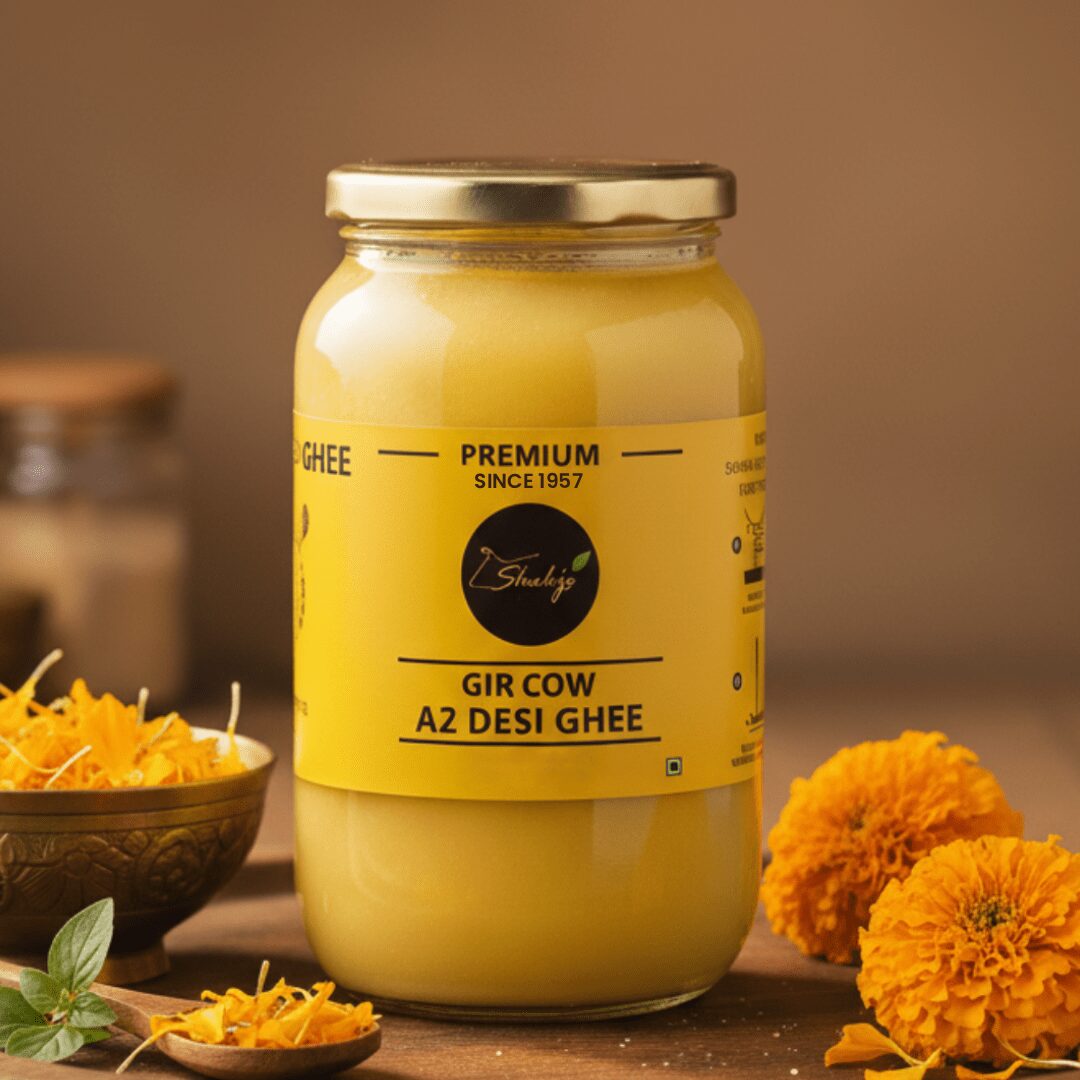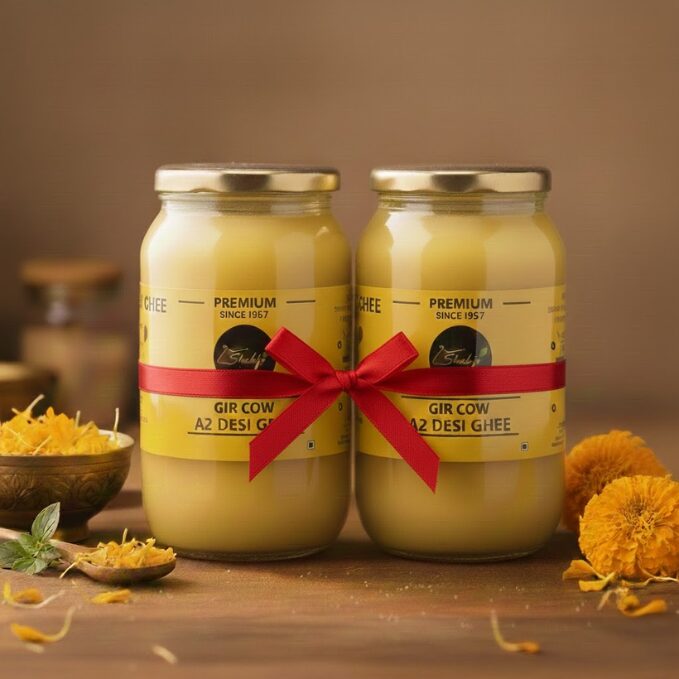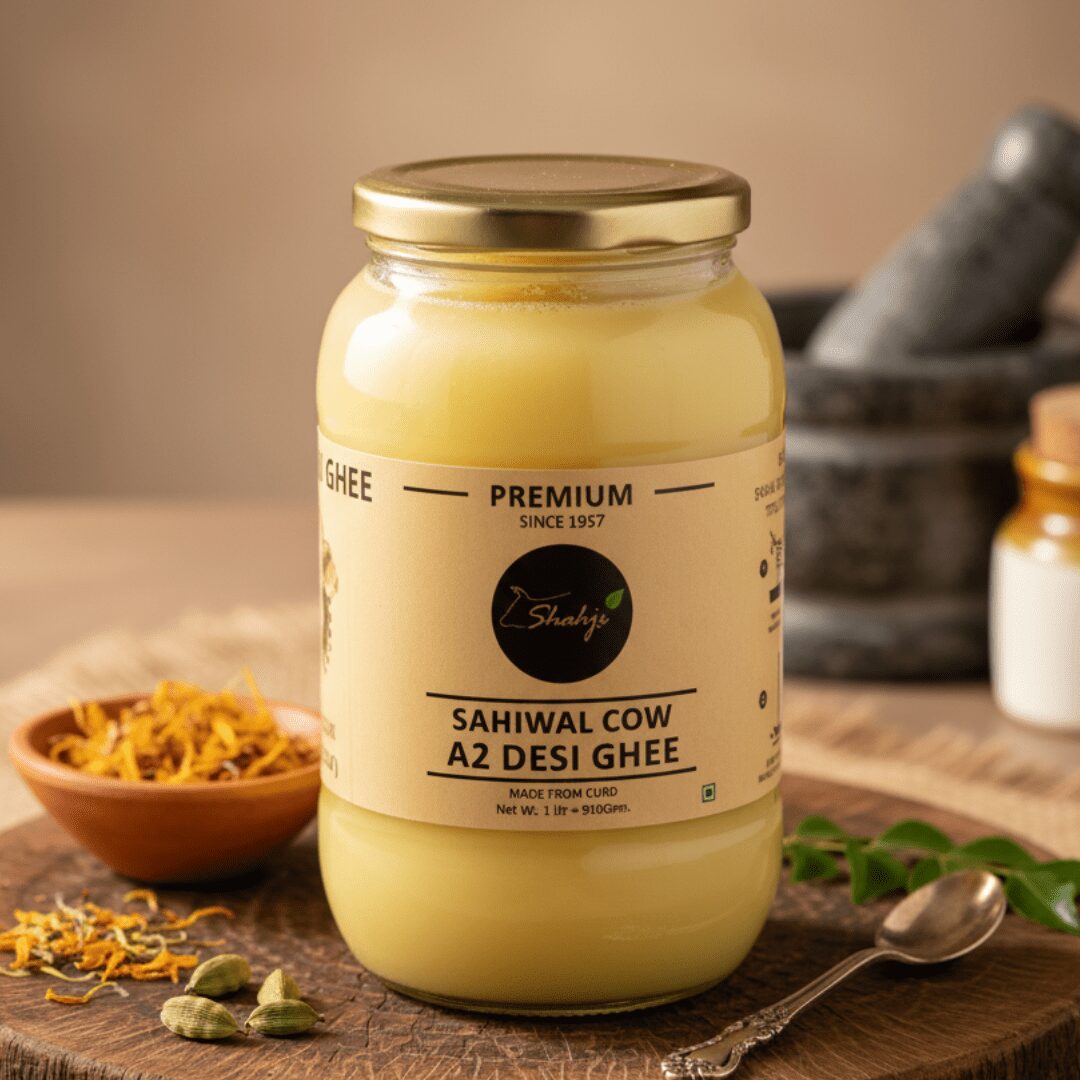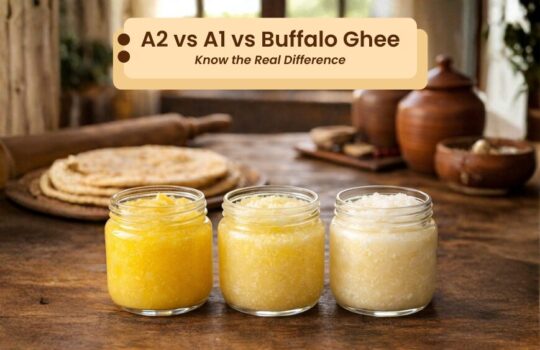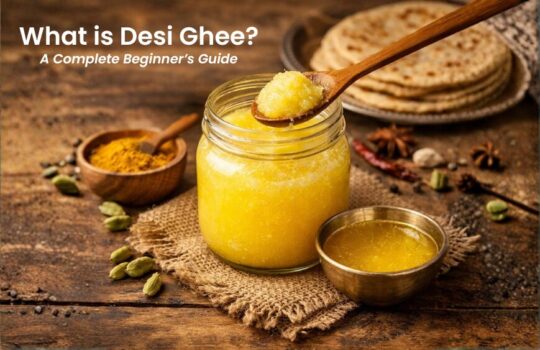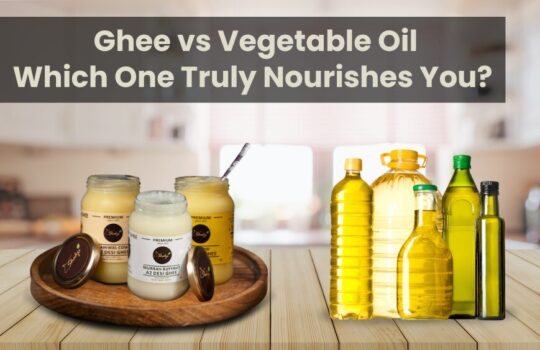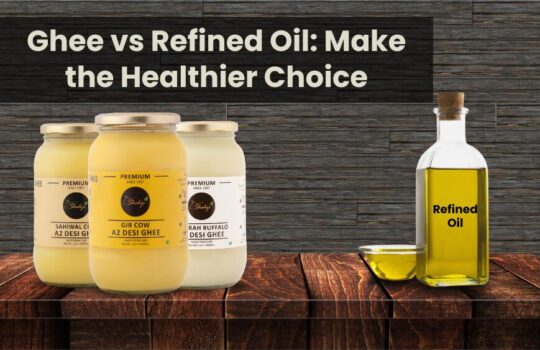Ghee vs Oil: Which is Better? – Shahjighee
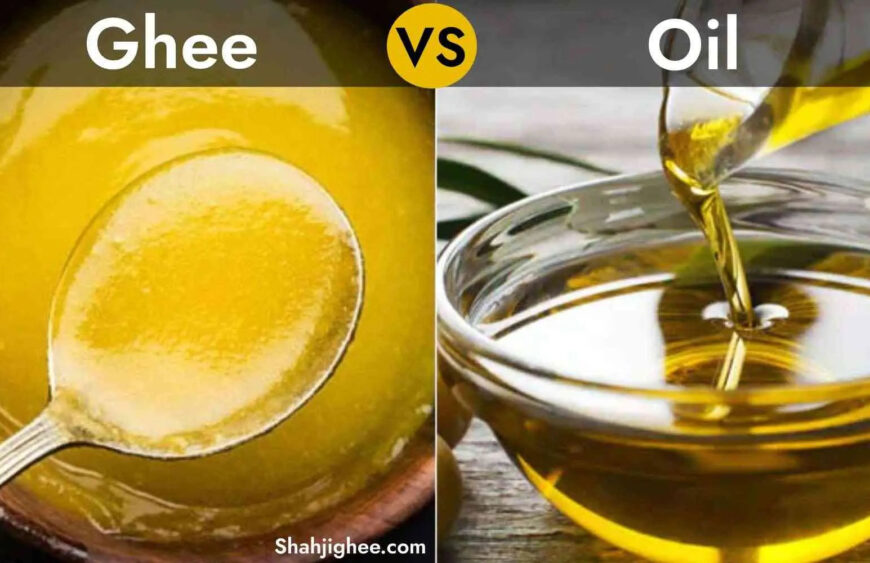
Ghee and cooking oils are used to add flavour and take away the rawness of dishes. However, there is a difference between the two cooking mediums. In the 1970s, ghee began to be regarded as fattening and harmful to the heart. So people started switching ghee to refined oils.
But as the world started transitioning towards the traditional foods, refined oils took a backseat. With people becoming super conscious about what they eat, desi ghee is regaining its lost glory as a superfood.
Desi ghee is said to be better than all oils, whether they are refined, cold-pressed, or wood-pressed. This is because of the chemical process of hydrogenation which is used in refining vegetable oils. It is now widely accepted that refined oils are not as healthy as earlier been taught.
Ghee Vs Oil: Which is better?
Difference Between Ghee and Oil | ||
|---|---|---|
Desi Ghee |
Oil | |
Source | Obtained from animal milk | Obtained from plant parts like a seed. |
Fat Content | High saturated fat, low unsaturated fatZero trans fats | High unsaturated fat, low saturated fat (except coconut oil which has higher saturated fat than even ghee)It may have trans fats |
Taste | Delicious smell and buttery taste which enhances the taste of a dish | Either tasteless or overpowering taste and smell |
Smoke Point & Stability | Has a high smoke point, doesn\’t break down quickly | Has lower smoke point than ghee, breaks down and releases free radicals after smoke point |
Nutrition | High in nutrition | Relatively lower in nutrition |
1. Source & Method of Preparation of Ghee and oil

Ghee is made from butter that is prepared from curdled animal milk (mostly cow or buffalo). The old method of ghee-making uses Bilona or a wooden beater to churn out butter from curd. Then the butter is heated on a slow fire and stirred slowly till the oil is formed over a reddish residue. The yellow oil is strained out and called Desi Ghee.
Cooking oils are sourced from plants. After their extraction, they are refined. After their extraction, they are refined. Ghee and Cooking oils both are used to fry and bake. They are also used in salad dressing, preparing dips, etc.
2. Fat Content in Ghee and oil
In desi ghee, the saturated fat is more than in other cooking oils. A 100g desi ghee pack has 60.8g saturated fats, while the same amount of refined oil has 14.4g saturated fat content.
Due to its high saturated fat content, ghee had been often wrongly labelled as “unhealthy” in the past. But the truth is just the opposite. Despite its saturated fat content, it mobilises fats from stubborn body parts. The short-chain fatty acid structure present in ghee ensures this. Ghee has zero trans-fats.
Refined oils. On the other hand, go through chemical processes that create trans-fats which are unhealthy.
3. Taste and Nature of Ghee and oil
Ghee has a delectable buttery flavour. The oil’s taste is as per the fruit or vegetable. Refined oils are generally tasteless. Apart from pickles or dishes requiring the tangy taste of mustard oil, Desi ghee is preferred to add rich flavour and aroma to dishes.
Ghee remains melted when it is hot, while it is in a semi-solid to solid state at colder temperatures. Most cooking oils are viscous liquids at room temperature. Some as coconut oil turn solid in the cold season.
4. Smoke Point of Ghee and oil
Ghee boasts a higher smoke point than vegetable oils and butter. Desi grass-fed ghee smoking point is 485 degrees Fahrenheit. So it does not burn at high temperatures. When oil or cooking fat is past its smoke point, which is lesser than ghee, it burns, becomes toxic, and releases free radicals, which are bad for health. A lot of cooking, frying, and baking is over 320°F temperature, but refined oils may become toxic at these temperatures.
5. Stability in Ghee and oil
Ghee has high stability as compared to oil. Beyond the smoke point, oil breaks down. Vegetable Oils can fry things at lower temperatures.
6. Nutrition and Health of Ghee and oil
The whole nutrition scenario is now supportive of Desi ghee. It is now looked upon as the best cooking medium because:
- Ghee has a healing effect. It reduces inflammation within the stomach as well as in the outer body. It is good to heal cuts, wounds, and burns. It has a cooling nature. Desi ghee is great for the stomach and intestines due to Butyrate, and does away with “Pitta Dosha”. Now consider coconut oil which is also helpful for healing. But it may not be chemical and trans-fat-free unless it is virgin coconut oil.
- Ghee is high in antioxidants and combats free radicals. As compared, refined oils oxidize beyond their smoke point and cause free radicals. These free radicals are cancerous. Olive oil and coconut oil are known to be healthy but have a lower smoke point than ghee.
- Ghee has essential short-chain fatty acids like DHA and CLA. It also has vitamins A, D, E, and K that are fat soluble. These make it a superfood that improves memory, and nervous and immune systems. It lubricates joints and promotes good cholesterol.
Now it is recommended for weight loss as well. In contrast, refined oils undergo hydrogenation which creates trans-fats, that are extremely harmful. So the oils become bad for health.
Conclusion
Vegetable oils, though marketed as being healthy because of their higher unsaturated fats, are not quite so because of the trans fats they may contain due to their refining process. These also oxidize at lower temperatures. So, Neyyi or Desi Ghee stands out for its superfood qualities over and above all cooking mediums, not just for the purity of its manufacturing process and its high smoke point, but also for its medicinal properties.
Of course, you must buy only pure desi ghee. As mentioned in our ancient text, desi ghee is lovingly made from grass-fed milk using the Bilona method. This process preserves all the nutrition. Remember that even Desi ghee, with its world of benefits, should also be taken in moderation – two to three teaspoons daily are mostly enough. Try Shahji Ghee, made with bilona process, for a taste fit for Gods.
A2 Gir Cow Ghee
1 LTR
Best Price: ₹2125 with Coupons

A2 Gir Cow Ghee 2 Litre Combo Pack
Best Price: ₹4125 with Coupons
A2 Sahiwal Cow Ghee
1 LTR
Best Price: ₹1619 with Coupons

Frequently Asked Questions – FAQs
Which is easy to digest ghee or oil?
Desi ghee is 100% healthy fats, mostly saturated fats. The saturated fats that we consume through ghee contain easily digestible fatty acids (89% short-chain fatty acids). These will not harm you. Instead, they act as antioxidants protecting your body from several health diseases like heart disease and cancer.
Is desi ghee more expensive than oil?
Yes, desi ghee is more expensive than oil. Desi ghee is expensive because it is totally hand-made and prepared by churning the curd through the bilona process. But making oil is totally mechanised process that needs less effort.
Why ghee is better than cooking oil?
Ghee is better than cooking oil because it is 100% healthy fats and has a high smoke point meaning it is ideal for cooking and deep frying. But cooking or any refined oil is not considered healthy because it contains trans-fats that can raise various health issues.
Should I replace oil with ghee?
Yes, what are you waiting for? Ghee is far far healthier ingredient than oil. Apart from making your food tastier it also enhances your body\’s health.
Read: 25+ health benefits of ghee
Which is the best ghee in India?
A2 ghee is the best ghee in India. In India, there are various A2 desi ghee brands such as Shahji Ghee, Anveshan, Gir Organic etc. You can go with any one of these.

